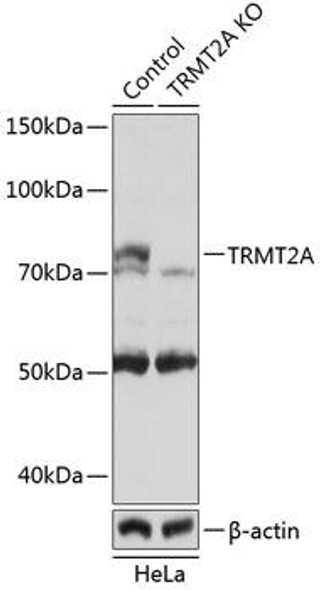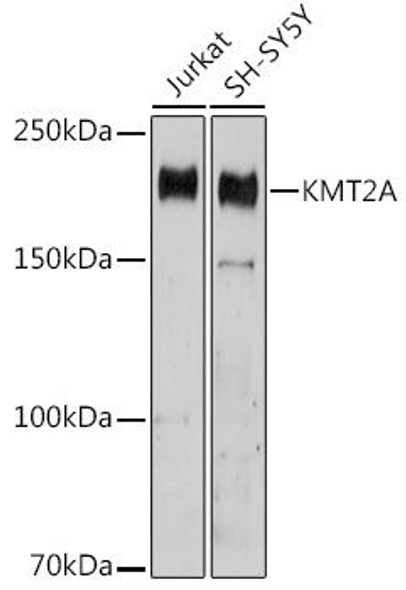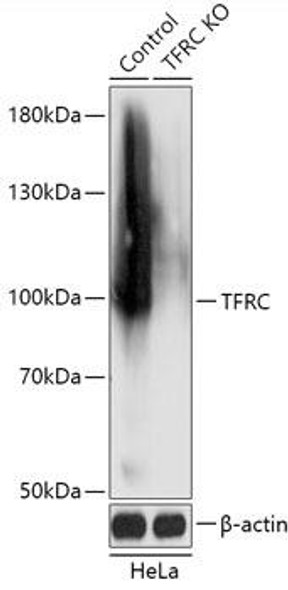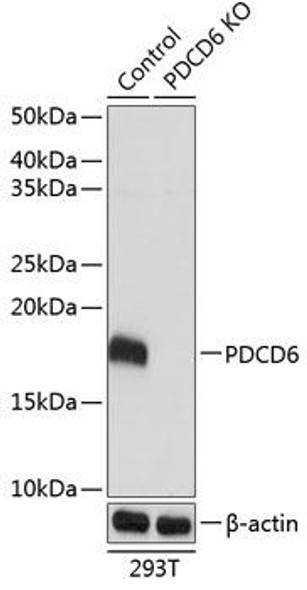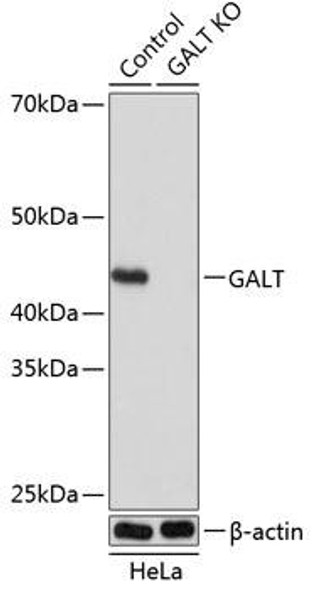Description
Anti-MSH6 Antibody (CAB18007)[KO Validated]
The MSH6 Polyclonal Antibody (CAB18007) is a valuable tool for researchers studying the MSH6 protein, a key component of the DNA mismatch repair system. This rabbit-derived antibody is highly specific to human samples and has been validated for use in Western blot applications. By binding to the MSH6 protein, this antibody enables researchers to detect and analyze MSH6 expression in various cell types, offering insights into its role in DNA repair and maintenance.MSH6 is a crucial player in maintaining genomic stability by recognizing and repairing DNA mismatches that occur during DNA replication and recombination.
Mutations in MSH6 have been linked to Lynch syndrome, a hereditary cancer predisposition syndrome, underscoring the importance of studying its function in cancer biology. With its ability to target MSH6, this antibody is an essential tool for investigations related to DNA repair mechanisms, cancer development, and potential therapeutic interventions.
| Antibody Name: | Anti-MSH6 Antibody [KO Validated] |
| Antibody SKU: | CAB18007 |
| Antibody Size: | 20uL, 50uL, 100uL |
| Application: | WB IHC IF |
| Reactivity: | Human, Mouse, Monkey |
| Host Species: | Rabbit |
| Immunogen: | Recombinant fusion protein containing a sequence corresponding to amino acids 1-290 of human MSH6 (NP_000170.1). |
| Application: | WB IHC IF |
| Recommended Dilution: | WB 1:500 - 1:2000 IHC 1:50 - 1:200 IF 1:20 - 1:100 |
| Reactivity: | Human, Mouse, Monkey |
| Positive Samples: | HeLa |
| Immunogen: | Recombinant fusion protein containing a sequence corresponding to amino acids 1-290 of human MSH6 (NP_000170.1). |
| Purification Method: | Affinity purification |
| Storage Buffer: | Store at -20°C. Avoid freeze / thaw cycles. Buffer: PBS with 0.02% sodium azide, 50% glycerol, pH7.3. |
| Isotype: | IgG |
| Sequence: | MSRQ STLY SFFP KSPA LSDA NKAS ARAS REGG RAAA APGA SPSP GGDA AWSE AGPG PRPL ARSA SPPK AKNL NGGL RRSV APAA PTSC DFSP GDLV WAKM EGYP WWPC LVYN HPFD GTFI REKG KSVR VHVQ FFDD SPTR GWVS KRLL KPYT GSKS KEAQ KGGH FYSA KPEI LRAM QRAD EALN KDKI KRLE LAVC DEPS EPEE EEEM EVGT TYVT DKSE EDNE IESE EEVQ PKTQ GSRR SSRQ IKKR RVIS DSES DIGG SDVE FKPD TKEE GSSD EISS GVGD SESE GL |
| Gene ID: | 2956 |
| Uniprot: | P52701 |
| Cellular Location: | Chromosome, Nucleus |
| Calculated MW: | 119kDa/120kDa/137kDa/152kDa |
| Observed MW: | 160kDa |
| Synonyms: | MSH6, GTBP, GTMBP, HNPCC5, HSAP, p160 |
| Background: | This gene encodes a member of the DNA mismatch repair MutS family. In E. coli, the MutS protein helps in the recognition of mismatched nucleotides prior to their repair. A highly conserved region of approximately 150 aa, called the Walker-A adenine nucleotide binding motif, exists in MutS homologs. The encoded protein heterodimerizes with MSH2 to form a mismatch recognition complex that functions as a bidirectional molecular switch that exchanges ADP and ATP as DNA mismatches are bound and dissociated. Mutations in this gene may be associated with hereditary nonpolyposis colon cancer, colorectal cancer, and endometrial cancer. Transcripts variants encoding different isoforms have been described. |
| UniProt Protein Function: | MSH6: Component of the post-replicative DNA mismatch repair system (MMR). Heterodimerizes with MSH2 to form MutS alpha, which binds to DNA mismatches thereby initiating DNA repair. When bound, MutS alpha bends the DNA helix and shields approximately 20 base pairs, and recognizes single base mismatches and dinucleotide insertion-deletion loops (IDL) in the DNA. After mismatch binding, forms a ternary complex with the MutL alpha heterodimer, which is thought to be responsible for directing the downstream MMR events, including strand discrimination, excision, and resynthesis. ATP binding and hydrolysis play a pivotal role in mismatch repair functions. The ATPase activity associated with MutS alpha regulates binding similar to a molecular switch: mismatched DNA provokes ADP-->ATP exchange, resulting in a discernible conformational transition that converts MutS alpha into a sliding clamp capable of hydrolysis-independent diffusion along the DNA backbone. This transition is crucial for mismatch repair. MutS alpha may also play a role in DNA homologous recombination repair. Heterodimer consisting of MSH2-MSH6 (MutS alpha). Forms a ternary complex with MutL alpha (MLH1-PMS1). Interacts with EXO1. Part of the BRCA1-associated genome surveillance complex (BASC), which contains BRCA1, MSH2, MSH6, MLH1, ATM, BLM, PMS2 and the RAD50-MRE11-NBS1 protein complex. This association could be a dynamic process changing throughout the cell cycle and within subnuclear domains. Interacts with ATR. Belongs to the DNA mismatch repair MutS family. 2 isoforms of the human protein are produced by alternative splicing. |
| UniProt Protein Details: | Protein type:DNA-binding Chromosomal Location of Human Ortholog: 2p16 Cellular Component: nucleoplasm; Golgi apparatus; nuclear chromosome; intracellular membrane-bound organelle; nuclear chromatin; cytoplasm; plasma membrane; MutSalpha complex Molecular Function:DNA-dependent ATPase activity; protein homodimerization activity; single thymine insertion binding; ATPase activity; oxidized purine DNA binding; magnesium ion binding; ADP binding; methylated histone residue binding; mismatched DNA binding; protein binding; four-way junction DNA binding; single guanine insertion binding; guanine/thymine mispair binding; double-stranded DNA binding; MutLalpha complex binding; chromatin binding; ATP binding Biological Process: negative regulation of DNA recombination; mismatch repair; somatic hypermutation of immunoglobulin genes; isotype switching; determination of adult life span; DNA repair; maintenance of DNA repeat elements; meiotic mismatch repair; positive regulation of helicase activity; DNA damage response, signal transduction resulting in induction of apoptosis; meiotic recombination; somatic recombination of immunoglobulin gene segments; response to UV Disease: Colorectal Cancer, Hereditary Nonpolyposis, Type 5; Endometrial Cancer; Mismatch Repair Cancer Syndrome |
| NCBI Summary: | This gene encodes a member of the DNA mismatch repair MutS family. In E. coli, the MutS protein helps in the recognition of mismatched nucleotides prior to their repair. A highly conserved region of approximately 150 aa, called the Walker-A adenine nucleotide binding motif, exists in MutS homologs. The encoded protein heterodimerizes with MSH2 to form a mismatch recognition complex that functions as a bidirectional molecular switch that exchanges ADP and ATP as DNA mismatches are bound and dissociated. Mutations in this gene may be associated with hereditary nonpolyposis colon cancer, colorectal cancer, and endometrial cancer. Transcripts variants encoding different isoforms have been described. [provided by RefSeq, Jul 2013] |
| UniProt Code: | P52701 |
| NCBI GenInfo Identifier: | 68067672 |
| NCBI Gene ID: | 2956 |
| NCBI Accession: | P52701.2 |
| UniProt Secondary Accession: | P52701,O43706, O43917, Q8TCX4, Q9BTB5, B4DF41, B4E3I4 F5H2F9, |
| UniProt Related Accession: | P52701 |
| Molecular Weight: | 1360 |
| NCBI Full Name: | DNA mismatch repair protein Msh6 |
| NCBI Synonym Full Names: | mutS homolog 6 |
| NCBI Official Symbol: | MSH6 |
| NCBI Official Synonym Symbols: | GTBP; HSAP; p160; GTMBP; HNPCC5 |
| NCBI Protein Information: | DNA mismatch repair protein Msh6; sperm-associated protein; mutS-alpha 160 kDa subunit; G/T mismatch-binding protein |
| UniProt Protein Name: | DNA mismatch repair protein Msh6 |
| UniProt Synonym Protein Names: | G/T mismatch-binding protein; GTBP; GTMBP; MutS-alpha 160 kDa subunit; p160 |
| Protein Family: | DNA mismatch repair protein |
| UniProt Gene Name: | MSH6 |
| UniProt Entry Name: | MSH6_HUMAN |

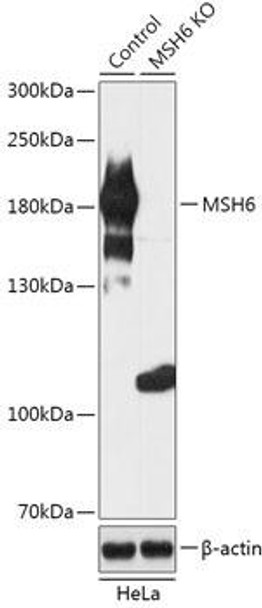
![Anti-MSH6 Antibody [KO Validated] (CAB18007)](https://cdn11.bigcommerce.com/s-h68l9z2lnx/product_images/h/312/A18007_1__34084.jpg)


